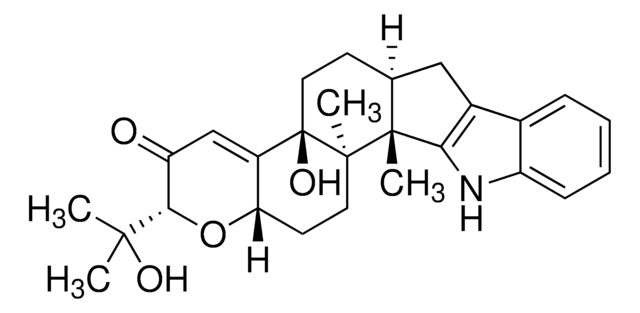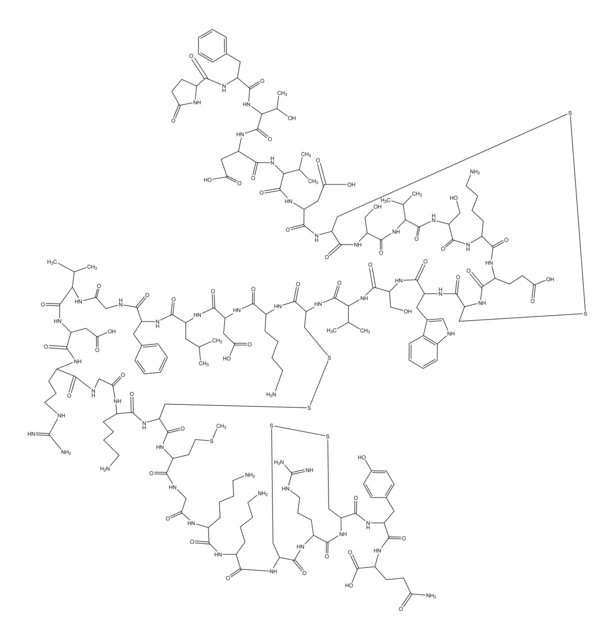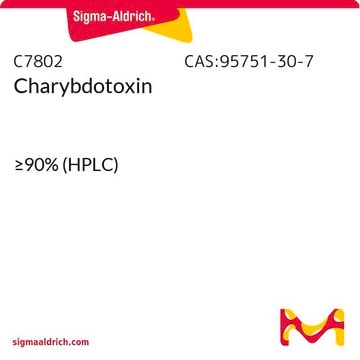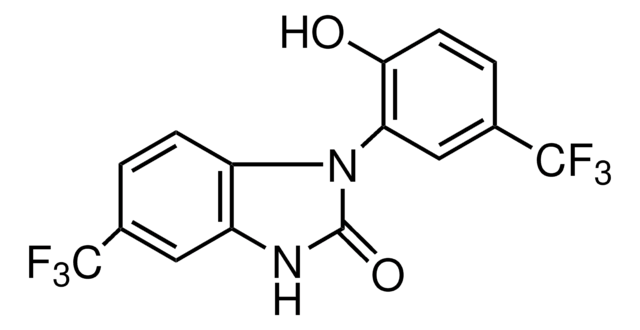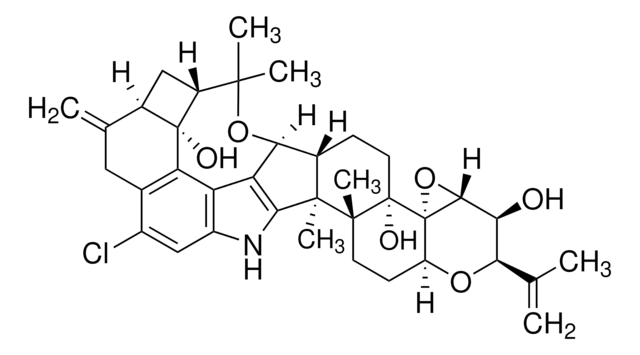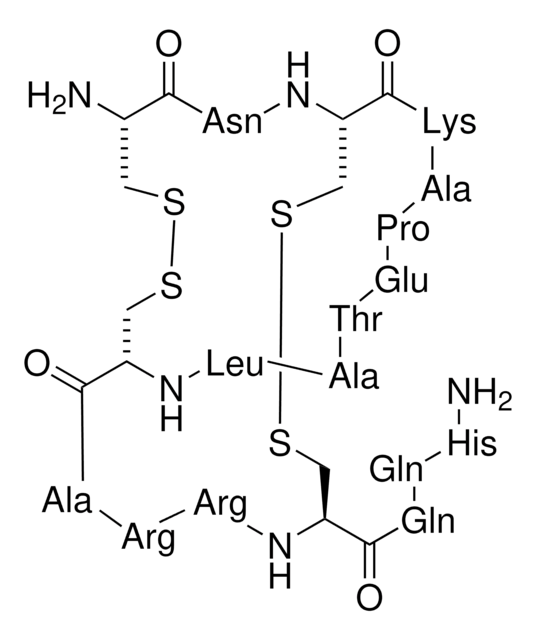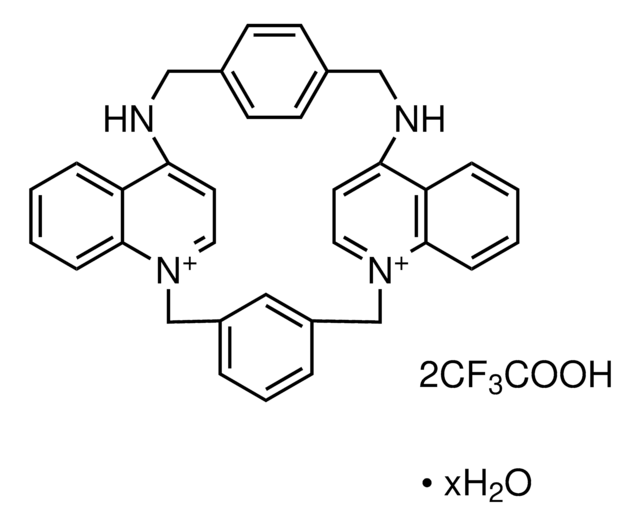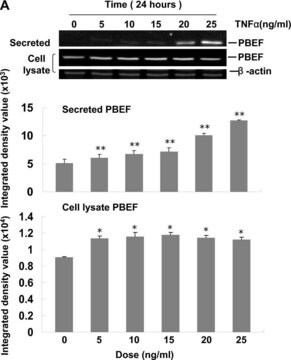I5904
Iberiotoxin, recombinant from Mesobuthus tamulus
≥98% (HPLC), recombinant, expressed in E. coli
Synonym(s):
IbTX
Sign Into View Organizational & Contract Pricing
All Photos(1)
About This Item
Empirical Formula (Hill Notation):
C179H276N50O56S7
Molecular Weight:
4248.86
UNSPSC Code:
12352200
PubChem Substance ID:
NACRES:
NA.77
Recommended Products
Amino Acid Sequence
Glp-Phe-Thr-Asp-Val-Asp-Cys-Ser-Val-Ser-Lys-Glu-Cys-Trp-Ser-Val-Cys-Lys-Asp-Leu-Phe-Gly-Val-Asp-Arg-Gly-Lys-Cys-Met-Gly-Lys-Lys-Cys-Arg-Cys-Tyr-Gln [Disulfide Bridges: 7−28; 13−33; 17−35]
Application
Iberiotoxin, recombinant from Mesobuthus tamulus has been used as an inhibitor of large-conductance calcium-activated K+ channels to study its effect on the NLRP3 (nucleotide-binding oligomerization domain-like receptor containing pyrin domain 3) inflammasome activation in bone marrow-derived macrophages (BMDMs). It has also been used to block Ca2+- activated K+ channels to determine interleukin(IL)-1β in BMDCs following inflammasome activation.
Biochem/physiol Actions
The single chain peptide iberiotoxin (IbTX) is a selective and reversible inhibitor of high-conductance calcium-activated potassium channels (PK,Ca). It occurs naturally in the venom of the scorpion Buthus tamulus. IbTX also modulates the binding of charybdotoxin (CbTX) to smooth muscle sarcolemmal membranes in a non-competitive manner. IbTX is similar in size to CbTX and shares considerable sequence homology with CbTX. However, IbTX differs in its overall charge in having one fewer basic and four more acidic residues than CbTX.
Exhibits the same activity as the natural form of the toxin
Features and Benefits
This compound is featured on the Potassium Channels page of the Handbook of Receptor Classification and Signal Transduction. To browse other handbook pages, click here.
Preparation Note
Soluble in aqueous buffers. Stock solutions of 1 μM can be aliquoted and stored at -20 °C for up to 3 months.
Signal Word
Danger
Hazard Statements
Precautionary Statements
Hazard Classifications
Acute Tox. 1 Inhalation - Acute Tox. 2 Dermal - Acute Tox. 2 Oral
Storage Class Code
6.1A - Combustible acute toxic Cat. 1 and 2 / very toxic hazardous materials
WGK
WGK 3
Personal Protective Equipment
dust mask type N95 (US), Eyeshields, Gloves
Certificates of Analysis (COA)
Search for Certificates of Analysis (COA) by entering the products Lot/Batch Number. Lot and Batch Numbers can be found on a product’s label following the words ‘Lot’ or ‘Batch’.
Already Own This Product?
Find documentation for the products that you have recently purchased in the Document Library.
Customers Also Viewed
Targeting TMEM176B Enhances Antitumor Immunity and Augments the Efficacy of Immune Checkpoint Blockers by Unleashing Inflammasome Activation
Segovia M, et al.
Cancer Cell, 35(5), 767-781 (2019)
Qi Kong et al.
Diabetes, metabolic syndrome and obesity : targets and therapy, 17, 247-257 (2024-01-25)
The aim of this study was to investigate the effects and mechanisms of SGLT2 inhibitor empagliflozin on diabetic coronary function. A rat diabetic model was established by injection of streptozotocin. Rats in the treated group were administered empagliflozin by gavage
The TWIK2 potassium efflux channel in macrophages mediates NLRP3 inflammasome-induced inflammation
Di A, et al.
Immunity, 49(1), 56-65 (2018)
Shuai Hu et al.
The Journal of experimental medicine, 218(3) (2020-12-22)
Podocyte injury is a common hallmark in various glomerular diseases. The level of LRRC55 was increased in podocytes of patients with focal segmental glomerulosclerosis (FSGS), diabetic nephropathy (DN), and membranous nephropathy (MN). Upregulated LRRC55 and increased intracellular Ca2+ led to
Mandy Koopman et al.
Cell reports, 43(5), 114204-114204 (2024-05-15)
Amyotrophic lateral sclerosis can be caused by abnormal accumulation of TAR DNA-binding protein 43 (TDP-43) in the cytoplasm of neurons. Here, we use a C. elegans model for TDP-43-induced toxicity to identify the biological mechanisms that lead to disease-related phenotypes. By
Our team of scientists has experience in all areas of research including Life Science, Material Science, Chemical Synthesis, Chromatography, Analytical and many others.
Contact Technical Service